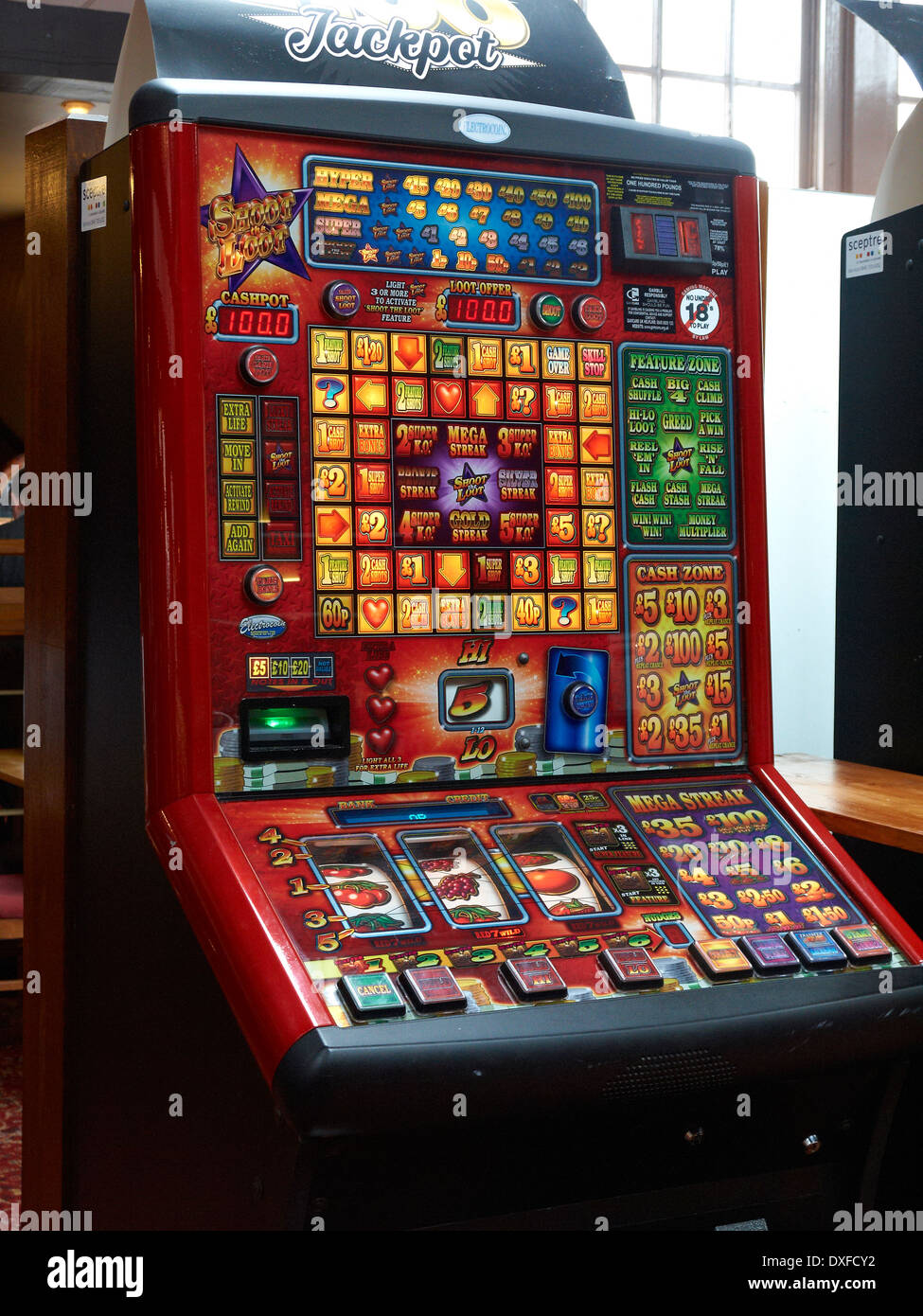- Tickets, jar tickets, pickle cards, Lucky Seven cards, Nevada Club tickets, casino nights, Las Vegas nights and coin-op - erated gambling devices. Coin-operated gambling devices include slot machines, electronic video slot or line games, video poker, video blackjack, video keno, video bingo, video pull-tab games and so on.
- Gaming machines in pubs and bars Certain premises, which are licensed for the sale of alcohol, are entitled to make a number of gaming machines available for use on their premises, if we have given.
- A slot machine (American English), known variously as a fruit machine (British English), puggy (Scottish English), the slots (Canadian English and American English), poker machine/pokies (Australian English and New Zealand English), fruities (British English) or slots (American English), is a gambling machine that creates a game of chance for its customers.
Vukani Gaming Corporation (Pty) Ltd (the VGroup), is the leading supplier of Limited Pay-out Machines (LPMs), and an operator of both VSlots and Luck@It LPMs in South Africa. The Group is 100% South.
Gambling in New Zealand is controlled by the Department of Internal Affairs. All public gambling is expected to return a portion of profits to the community. The largest proportion of the gambling industry is operated by state-owned institutions. Expenditure on gambling (losses experienced by players) was $NZ 2.034 billion in 2008 ($NZ 480 per capita), a tenfold increase over 1985 figures.[1]
Horse racing[edit]
Bookmaking was declared illegal in New Zealand in 1920.[2] From then until the introduction of the Totalizator Agency Board (TAB) in 1961, betting on racing was only available on-course.


Lotteries[edit]
The first 'Art Union' was conducted in New Zealand by the Otago Art Society in December 1877,[3] Both individuals and organizations subsequently used them as a way of raising funds.The first national lotteries were established in 1933. They were known as 'Art Unions'. Prizes were relatively small, and in the early Art Unions the prizes were quantities of alluvial gold. As an example, the 'Golden Treasure' Art Union of 1935 had 200,000 tickets with a top prize of £2000 ranging down to an 11th prize of £20 plus 400 prizes of £2.[4] The low returns tempted many people to (illegally) purchase tickets in overseas lotteries such as the Australian Tattersall's lottery. With Art Union sales declining, a review of lotteries was undertaken by the Second Labour Government in the late 1950s, and in 1961 the National Government introduced the Golden Kiwi lottery.[5]

The New Zealand Lotteries Commission was established in 1987. Its original product, Lotto, has since been supplemented by Instant Kiwiscratch cards, daily Keno and a Lotto variant named Big Wednesday. Lotto tickets became available online in 2008.

The Totalizator Agency Board, commonly called the TAB, is a sports betting organisation run by the New Zealand Racing Board.
'Pokies'[edit]
Introduced in 1987, slot machines, commonly known as 'pokies', are operated by charitable foundations and are mostly placed in hotels and bars. Maximum jackpots are regulated. In the year ending 30 June 2008, turnover was $10.096 billion, of which $9.158 billion was returned as prizes (player losses were $938 million). These figures represent a 9% decrease from the peak year of 2004. Pokies accounted for 46.1% of gambling expenditure (losses) in 2008.[1]The year to 30 June 2009 saw a further 5% fall in expenditure, to $889 million. There were 19,479 machines in 1,501 venues operated by 384 licensees, all of these figures being a decrease from 2008.[6]
Since 1 July 2009, all machines must have Player Information Displays, which inform the gambler how long they have been playing, how much they have lost, and which encourage them to take breaks.[6]
A 2010 study linked the prevalence of slot machines with high crime levels.[citation needed]
In May 2013 the Government announced it would allow casino SkyCity Auckland to install an additional 230 pokie machines and 40 new gambling tables, in exchange for a $402 million convention centre.[7][8]
Casinos[edit]
There are six casinos operating in New Zealand, the first of which opened in 1994:
See also[edit]
References[edit]
- ^ ab'GAMBLING EXPENDITURE STATISTICS 1984-2008'(PDF). Department of Internal Affairs. Retrieved 1 July 2009.
- ^'Gambling: An Economically Significant Industry'. Statistics New Zealand. September 1999. Archived from the original on 4 May 2009.
- ^See Grey River Argus, 20 Dec 1877, page 2)
- ^'Golden Treasure Art Union Results'. The New Zealand Railways Magazine, Volume 10, Issue 5. NZ Electronic Text Centre. 1 August 1935.
- ^NZ History.net - first Golden kiwi Lottery
- ^ ab'Pokie machine spending down to seven-year low'. NZPA. 14 July 2009. Retrieved 14 July 2009.
- ^'SkyCity convention centre set to create 800 jobs - Joyce'. TV NZ. 13 May 2013. Archived from the original on 10 June 2013.
- ^'SkyCity's pokie full house'. Stuff.co.nz. 13 May 2013.
Further reading[edit]

- Curtis, Bruce (2002) Gambling in New Zealand Dunmore Press ISBN0-86469-404-0
External links[edit]
Bar Gambling Machines For Sale
- Gambling information page at the Department of Internal Affairs
- Gaming policy - Department of Internal Affairs
- New Zealand wants to regulate offshore casinos - New Zealand Government wants to regulate online gambling with overseas providers!
- Gambling Act 2003 - text of the Act
Create your own raffle
Our website is the only website which allows users to create raffles and take all the profit from it, which is guaranteed. This is something you probably didn't see before on any other pubg gambling website. Other websites create raffles themselves and take ~10%-25% more then the item's worth. We allow you to do that and in the same time the creator of the raffle can get only 5% if he wants, which is much lower than our competitors take. As the creator you can choose to take 5%, 10% and 25% more than your item's worth. Obviously, 5% will help him get the profit faster since the 5% raffles should end first.
Example of how you make profit as a raffle creator
1. You create a raffle with an item worth 100 credits with 10% fee (that means you will get 100 credits + 10%, so 110 credits).
2. You choose a maximum number of tickets which can be between 2 and 100. The price of a ticket is 100 credits + 10%, so 110 divided by the number of tickets, which for example is 100. So the price of one ticket to join your raffle will be 1.1 credits.
3. When all the tickets are bought, a winner is picked and you get the credits payed for all the tickets, which in this case would be 110 credits, and the winner will receive the item. So you will get a 10 credits profit just by creating a raffle. Obviously, you will always end up in profit and you can create as many raffles as you want.
How to create a raffle
Steps here.
Tavern Gambling Machines For Sale
How to join a raffle
Steps here.